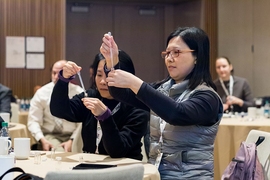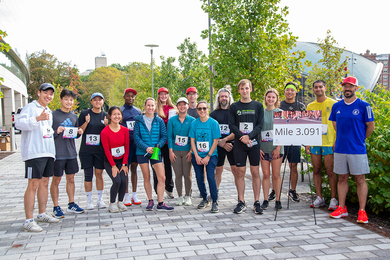J-PAL North America, a research center at MIT, has announced that it will partner with two leading education technology nonprofits to test promising models to improve learning, as part of the inaugural round of the Education, Technology, and Opportunity Innovation Competition.
Launched at MIT this past year, J-PAL North America’s Education, Technology, and Opportunity Innovation Competition supports education leaders in using randomized evaluations to generate evidence on how technology can improve student learning, particularly for students from disadvantaged backgrounds.
J-PAL North America’s inaugural competition partners are the Family Engagement Lab, an education technology nonprofit that aims to promote effective at-home learning opportunities, and the Western Governors University Center for Applied Learning Science, an online innovation lab that seeks to improve student performance in math.
“We’re excited to partner with Family Engagement Lab and Western Governors University to develop randomized evaluations that can help us better understand the potential for technology to meaningfully improve education outcomes,” says Philip Oreopoulos, professor of economics at the University of Toronto and co-chair of the J-PAL Education, Technology, and Opportunity Initiative. “Technology presents an exciting opportunity to deliver promising new and novel approaches at scale. But with so many innovative programs out there, it’s crucial that researchers and practitioners work together to test, identify, and improve upon effective programs and understand their mechanisms.”
Family Engagement Lab will partner with J-PAL North America to develop an evaluation of FASTalk (Families and Schools Talk), a multilingual digital messaging platform that helps prekindergarten through grade 5 teachers engage with hard-to-reach parents.
Family engagement in the learning process has been found to improve student outcomes. However, it can be challenging for teachers to connect with their students’ families and ensure that classroom learnings are reinforced by learning activities at home. For some households, language barriers make teacher-to-parent communication particularly challenging.
Through the FASTalk platform, teachers can send learning tips and activities to the child’s caregiver in their home language. Message content is aligned to the curriculum and academic calendar. Moreover, the content is pre-scheduled and automatically sent out to reduce demands on teacher time. The platform also supports a two-way dialogue between teachers and parents to facilitate ongoing, reciprocal communication.
"We’re thrilled to be a winner of the J-PAL Education, Technology, and Opportunity Innovation Competition,” says Elisabeth O’Bryon, co-founder and head of research for Family Engagement Lab. “Understanding the impact of FASTalk is crucial as we work towards our goal of developing a scalable, evidence-based family engagement program that meaningfully supports teachers, families, and students. It is an amazing opportunity to have J-PAL’s support to design and implement a randomized evaluation of FASTalk to evaluate the student-level effects of teachers sending curriculum-aligned learning activities to families."
Western Governors University’s (WGU) Center for Applied Learning Science (CALS) seeks to develop scalable models to improve student learning in math. Almost 64 percent of adult learners start at WGU with limited math proficiency, and survey results indicate that many WGU students feel anxiety around their math ability and aptitude.
WGU is partnering with J-PAL North America to rigorously evaluate a suite of four adaptive online interventions that support mathematical thinking and reasoning. The interventions aim to help students cultivate a math mindset, offer concrete strategies to reduce math anxiety, and utilize concept mapping to increase comprehension of key math concepts.
Beyond its population of 95,000 online learners, WGU seeks to understand whether these interventions can improve math and overall academic performance at community colleges.
“We are honored to be named partners with J-PAL. CALS is focused on using scientific principles to develop and evaluate ed-tech products that improve student learning,” says Jason Levin, vice president of institutional research at WGU. “J-PAL’s mission of using rigorous science to improve outcomes for disadvantaged groups is perfectly aligned with what we do at CALS. We look forward to learning from the network of experience that J-PAL provides. Together with J-PAL we hope to make a big impact for students.”
J-PAL North America will work with these two organizations to build evidence around how technology can improve learning. Despite rapid innovation and substantial investment in education technology, there is little rigorous research to help decision-makers understand which uses of education technology are truly helping students learn.
J-PAL North America is a regional office of the Abdul Latif Jameel Poverty Action Lab. J-PAL was established in 2003 as a research center at MIT’s Department of Economics within the School of Humanities, Arts, and Social Sciences. Since then, it has built a global network of affiliated professors based at over 50 universities and regional offices in Africa, Europe, Latin America and the Caribbean, North America, South Asia, and Southeast Asia. J-PAL North America was established with support from the Alfred P. Sloan Foundation and the Laura and John Arnold Foundation and works to improve the effectiveness of social programs in North America through three core activities: research, policy outreach, and capacity building. J-PAL North America’s education technology work is supported by the Laura and John Arnold Foundation and the Overdeck Family Foundation.









